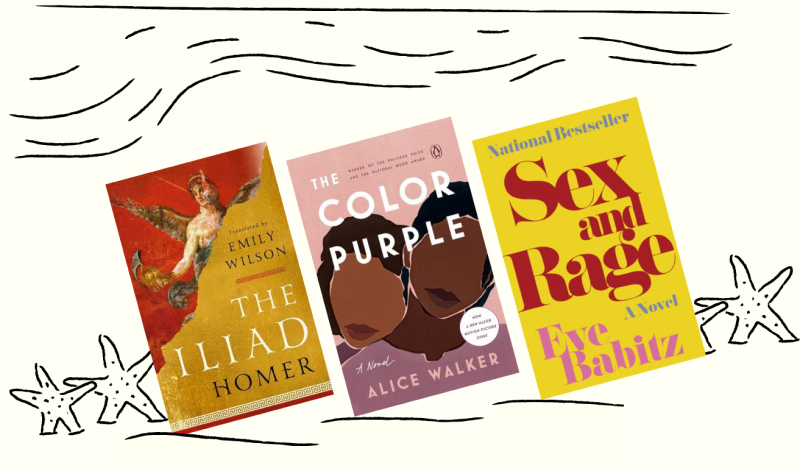- New Arrivals
Fiction
- Historical FictionCrime & ThrillersMysteryScience-FictionFantasyPoetryRomanceChildren’s BooksYoung Adult
- Biographies & MemoirsHistoryCurrent AffairsTech & ScienceBusinessSelf-DevelopmentTravelThe ArtsFood & WineReligion & SpiritualitySportsHumor
Children’s Books
Lists
Blog
Gift Cards
My Lists
Games
The co-op bookstore for avid readers
Five Classics to Read or Revisit This Summer
This summer, each member of the Tertulia staff is reading or revisiting a few classic books that feel especially timely and relevant to us at this moment. Here are a few of our recommendations so far!
This sci-fi classic, published in 1984, predicted the rise of the Web, hacking, virtual reality and AI.
Neuromancer by William Gibson
I started reading this sci-fi classic, which inspired the Matrix movies, a few weeks ago and was hooked instantly. As one of the progenitors of "cyberpunk," the dystopian society that Gibson depicts here is a glittering portrayal of a future where humanity and technology have become so interwoven that they are impossible to separate. Characters are equipped with tech modifications on their bodies and in their brains, allowing them to plug into a virtual world to steal data, while rogue AIs plot and scheme, independent of human control. While not all of Gibson's tech innovations have come to life (yet), it's mind-blowing how prescient the book was. -Emmanuel Hidalgo-Wohlleben
Eve Babitz, the Hollywood wild child turned quintessential literary LA icon, always makes for great summer reading. But it's a great time to brush up on her work in advance of a bombshell book about Babitz and Joan Didion coming out from Vanity Fair's Lili Anolik in the fall.
Sex and Rage by Eve Babitz
I started reading this book by Eve Babitz, the poet laureate of 60's and 70's L.A. counterculture, a few summers ago when I was pondering a move to Los Angeles. The sun-kissed bohemian life of the main character, Jacaranda, and the decadent lifestyle of the jet-setters in her orbit, makes for the ultimate summer read. Now is an especially good time to re-read all things Babitz on the eve of one of the publishing events of the year - the autumn release of Didion & Babitz, which promises to reveal the interior lives of one of the most famous pairs of literary frenemies of all time. -Lynda Hammes
Preorder the forthcoming Didion & Babitz
The screen reboot of The Color Purple last year has had so many people reminiscing about the original blockbuster film and, of course, Alice Walker’s Pulitzer Prize-winning story of family, resilience and the power of love.
The Color Purple by Alice Walker
All my friends were headed to see the new movie musical produced by Steven Spielberg and Oprah and I still hadn't seen the first one with Whoopi Goldberg, Danny Glover—and Oprah, of course. So, I sat down and watched the whole thing through, beginning to end. I was so moved I didn't even want to watch the new movie; I wanted to go back and read the book. Sometimes, elements and themes can get lost with each derivative version of the original work. It becomes something like getting an apple from the grocery store. Now, I'd like to get it from the tree. -Iliyah Coles
Reading Homer has always been a way for us to find connection with an ancient story that has inspired millions of readers and shaped our culture. Recent translations by noted translator Emily Wilson have made The Odyssey and The Iliad even more relatable and accessible than ever before.
The Iliad by Homer (Translated by Emily Wilson)
As devastating conflicts rage in Europe, the Middle East and beyond, there has never been a better time to re-read this seminal book about the suffering and tragedy caused by war. I was impressed by how this timely and acclaimed new translation landed on so many "Best Of" lists last year and am finally taking time to read it. -Fernanda Gorgulho
During the past few years, some readers and critics have thoughtfully considered how we should read Russian classics in the shadow of the Ukraine war, and how to grapple with imperialist themes in Russian literature. Tolstoy tends to stand in his own category in this discourse, as he was a strict pacifist in the last three decades of his life. What better time to pickup his masterpiece than now?
War and Peace by Leo Tolstoy
For so many of us, summer is the right time to tackle dense classics that call for uninterrupted reading time in shady backyards—or air conditioned layovers. War and Peace has become a cliche of the doorstopper novel, with a reputation for being challenging to wade through due to its sheer heft (well over 1000 pages) and historical digressions. But the book is a highly accessible story with all the universal themes of human life: romance (and gossip), class struggles (and dreams), epic battles (and the politics behind them) and even comedy. The payoff of actually completing War and Peace is to take in the sweep of history through the fascinating, page-turning stories of ordinary people.
There's great debate over the best translation, and you don't want to cheap out, given the sheer number of hours you're spending with this book. We recommend the Vintage Classics edition by the Russian/English translation powerhouse couple Richard Pevear and Larissa Volokhonsky or the edition first published in the 1920s by Aylmer and Louise Maude, thought by many critics to be the most faithful, since it was approved by Tolstoy himself. -LH

